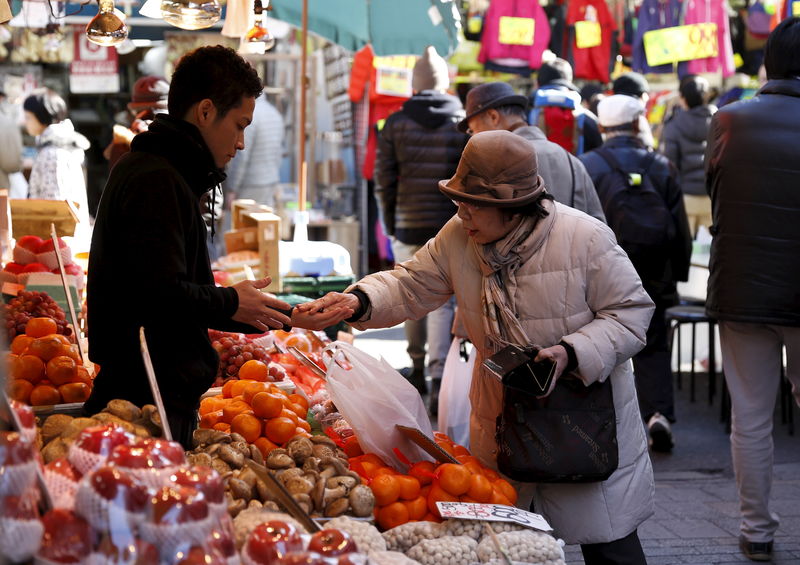 © Reuters. A woman pays money as she buys fruits outside a vegetable store at Ameyoko shopping district in Tokyo
© Reuters. A woman pays money as she buys fruits outside a vegetable store at Ameyoko shopping district in TokyoTOKYO (Reuters) – Japan’s household spending likely fell in January as a warm winter weighed on sales of seasonal items, a Reuters poll showed on Friday, and amid broader concerns over the economy following a run of weak data.
Household spending likely slipped 0.4 percent in January from a year earlier, the poll of 16 economists showed, after it rose 0.1 percent in December.
Warm weather slowed consumer spending on energy related items and hampered sales of winter clothes for the month but solid winter bonus payments are likely to have helped private expenditure, analysts said.
“Consumer spending is not strong but it is marginally growing as a trend. So the situation is not something we need to be seriously worried about,” said Yoshiki Shinke, chief economist at Dai-ichi Life Research Institute.
“Weakness in exports and factory output were prominent in the current economy, while consumer spending has not deteriorated.”
Japan’s exports posted their biggest decline in more than two years in January while factory output fell by the most in a year, in a sign slowing Chinese demand and the Sino-U.S. trade war were hurting the export-reliant economy.
“Wages and jobs market remain solid, which will likely underpin consumer spending,” said Yosuke Yasui, senior economist at Japan Research Institute.
But concerns remain over whether the boost in consumption will be big enough to offset weakness in exports, as faltering external demand and global trade war hurt business sentiment.
The government publishes household spending data at 8:30 a.m. Japan time on March 8, Friday (2330 GMT, March 7).
The current account balance, which will be released at 8:50 a.m. on Friday, is expected to show a surplus of 179.3 billion yen ($1.61 billion) in January, the poll found, narrowing from 452.8 billion yen in December.
A slowdown in exports to Asian nations is the main reason behind a shrinking in the current account surplus, analysts said.
Data showed capital spending accelerated in October-December in a sign economic growth will be revised up for the quarter, but economists warn slowing global trade may yet hurt activity in the first half of this year.
Fusion Media or anyone involved with Fusion Media will not accept any liability for loss or damage as a result of reliance on the information including data, quotes, charts and buy/sell signals contained within this website. Please be fully informed regarding the risks and costs associated with trading the financial markets, it is one of the riskiest investment forms possible.
Source: Investing.com





























